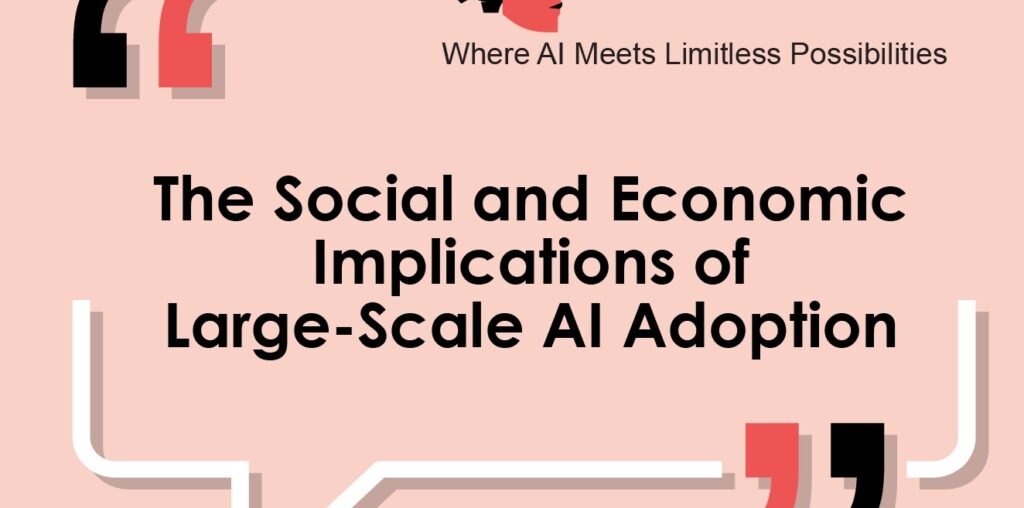The rapid adoption of artificial intelligence (AI) across various sectors is reshaping both social dynamics and economic landscapes. As AI technologies become increasingly sophisticated and integrated into everyday life, their implications extend far beyond technical advancements. Understanding the social and economic impact of large-scale AI adoption is crucial for navigating the opportunities and challenges it presents.
Economic Implications
- Productivity and Efficiency: AI has the potential to significantly boost productivity and efficiency across industries. Automation of repetitive tasks, optimization of supply chains, and enhanced data analysis can streamline operations and reduce costs. For example, AI-powered robots in manufacturing can work around the clock with high precision, while AI-driven analytics in finance can improve investment strategies and risk management.
- Job Displacement and Creation: One of the most discussed economic impacts of AI is its effect on employment. While AI and automation can displace certain jobs, particularly those involving routine tasks, they also create new opportunities. Jobs in AI development, data science, and robotics are on the rise. Additionally, AI can drive innovation in emerging fields, leading to new industries and job roles. The challenge lies in managing the transition for workers whose jobs are affected by AI, through reskilling and upskilling initiatives.
- Economic Inequality: The benefits of AI adoption are not uniformly distributed. Large corporations and technologically advanced countries are often better positioned to leverage AI, potentially widening the gap between them and smaller businesses or developing nations. Ensuring equitable access to AI technology and fostering inclusive growth is crucial to mitigate these disparities and prevent exacerbation of economic inequality.
- Market Dynamics and Competition: AI can disrupt traditional market dynamics, leading to shifts in competitive landscapes. Companies that successfully integrate AI may gain a competitive edge through innovation and efficiency, while those slower to adopt may struggle to keep up. This can lead to market consolidation as larger firms acquire smaller, innovative startups, altering industry structures and competition.
Social Implications
- Quality of Life and Personalization: AI has the potential to enhance quality of life through personalized services and products. In healthcare, AI-driven diagnostics and personalized treatment plans can improve patient outcomes. In consumer services, AI can offer tailored recommendations and experiences, from personalized shopping to customized digital content. This increased personalization can lead to greater convenience and satisfaction for individuals.
- Privacy and Surveillance: The widespread use of AI raises significant concerns about privacy and surveillance. AI systems often rely on extensive data collection, which can be used to monitor individuals’ behaviors and activities. The potential for misuse of this data, coupled with the proliferation of surveillance technologies, poses risks to individual privacy and civil liberties. Balancing the benefits of AI with robust privacy protections is essential for maintaining public trust.
- Social Interaction and Relationships: AI technologies, such as virtual assistants and social robots, are increasingly becoming part of daily life. While these technologies can offer companionship and support, they may also impact human relationships and social interactions. The increasing presence of AI in personal and professional contexts necessitates a consideration of how these interactions influence social dynamics and human connection.
- Ethical and Bias Concerns: AI systems can perpetuate and even exacerbate existing biases if not carefully managed. Biases in training data or algorithmic design can lead to unfair treatment in areas such as hiring, lending, and law enforcement. Addressing these ethical concerns and implementing safeguards to prevent discrimination are vital for ensuring that AI benefits all members of society fairly.
Navigating the Implications
To address the social and economic implications of large-scale AI adoption, a collaborative approach involving policymakers, businesses, and communities is necessary. Key strategies include:
- Developing Inclusive Policies: Governments should implement policies that promote equitable access to AI technology, support workforce transition through reskilling programs, and address potential economic inequalities.
- Enhancing Transparency and Accountability: Businesses and organizations should adopt transparent practices regarding data usage and AI decision-making processes, and establish mechanisms for accountability to address ethical concerns.
- Promoting Ethical AI Practices: AI developers and researchers should prioritize ethical considerations in their work, ensuring that AI systems are designed and deployed in ways that respect privacy, prevent bias, and enhance social well-being.
- Fostering Public Engagement: Engaging the public in discussions about AI and its implications can help build understanding, trust, and collaborative solutions to emerging challenges.
Conclusion
The large-scale adoption of AI carries profound social and economic implications, from transforming industries and job markets to raising privacy and ethical concerns. By proactively addressing these issues and striving for inclusive and responsible AI development, society can harness the benefits of AI while mitigating its risks. As AI continues to evolve, ongoing dialogue and thoughtful policy-making will be essential for ensuring that its impacts are positive and equitable for all.

